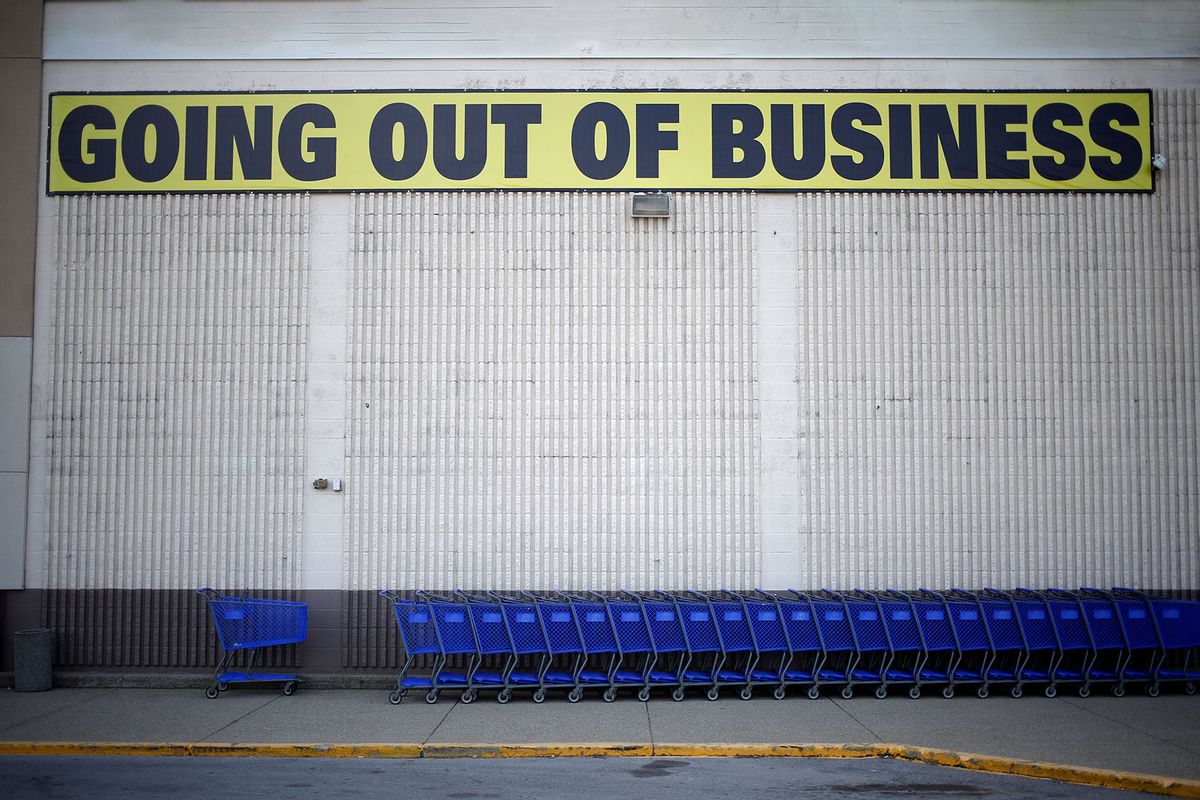Dollar Stores are so bad for communities.
But only regulation will change that. Poor people aren’t going to drive further and pay more.
Tbf, DG is no longer cheaper on anything that the one independently owned grocery store, except milk (about $2 so that’s worth it at $3.59)gallon), cookies (about a dollar) and crappy bread that’s overpriced at any grocery store. The nearest Walmart nearly 50 miles away was more expensive than our one, locally owned grocery store, which is significantly more expensive than the FL about 15 miles away, although some items are pleasantly and surprisingly less expensive (wild caught Pacific salmon filet, about$10 less. You can tell it isn’t farmed because of the taste and texture, but it’s not sockeye. Idk what it is, but it’s acceptable).
It’s never been about actually being cheaper, it’s about people thinking it’s cheaper so they shop there.
I know and I hate the stores I mentioned but it’s whatever is available and affordable at any given moment. I’m working on remedying that but gesture to everything.
Family Dollar moved into these neighborhoods undercut the local stores forcing them out of business, so now these folks will have nothing. Fuck Family Dollar!
And Walmart.
I read this as family doctor, and was really confused
The store’s existence doesn’t destroy the mom and pop store. People voting with their wallets choose the big chain over the small store. That’s not the fault of Dollar Admiral or whatever. That’s the fault of those in the community that chose to save a penny. Sometimes direct consequences happen from bad actions.
Yeah but it does, though. Having a large corporation move in a poor neighborhood, and give people incentives to buy with them instead by offering lower prices UNTIL the competition is gone, leaving them with no alternative, is pretty much the same MO as Nestle giving powder milk for free to mother in Africa until their bodies would produce milk itself, leaving them with no alternative.
It’s scummy greedy behavior from corporations that choose to do this. You can’t fault poor people from they ng to buy slightly cheaper, it’s not like they have much options otherwise.
This isn’t a secret and it isn’t the 1800s where news of snake oil salesmen takes 5 weeks to reach the new world.
You know all of this going into the store. You know that by shopping there, the smaller chains and local stores will leave. You know you’ll then be paying more and have poorer quality. You choose to support. You can also choose to live the same way you were and not make your life worse later.
If the store wasn’t there the other stores would still exist. The store being there doesn’t prevent you from going to the other stores. You can make an excuse, but all you’re doing is screwing yourself.
What you’re saying would work if in the only one shopping there. I’m not. There are thousands of people shopping there and you can’t control all of them. If I’m the only one sticking to my principles, I’m still screwed.
It’s easy to use the “Vote with your wallet” when you have funds to do so. People can’t vote with their wallets when they are making a choice between eating themselves, feeding their children, buying the life saving meds they need, etc. That choice is effectively removed from them, they have to go with the lowest available cost. Also consider that Family Dollar only carries the high margin items and nothing else. The local stores that carry fruit and veg do so at little to no margin or at a loss, so when they go under due to a Family Dollar moving in the community often will have no access to such items even if they (Family Dollar) stays, but to then leave the area and abandon a community after killing the local stores in the name of the all mighty dollar. . . . . They are just scum.
That’s an excuse. You want something slightly better now for a short time and bad for a long time? Or slightly worse now and better for a long time? If you can’t make that choice properly, you deserve the consequences of your poor choice. If you assume everyone else will do the right thing so you don’t have to, you also deserve the consequences to your poor choice.
Start blaming those that actually cause the issue, not the dealer. It sucks there’s cocaine available to buy. Just don’t buy it. If you do, that’s fully your fault. Not the dealer.
Can somebody help me out? The title of the article suggests it will provide insight into the cause of large grocery retailers avoiding certain communities but all I am seeing is talk about the what and nothing about the why. Did I miss it or did I just fall for clickbait?
It’s a fluff piece. They briefly describe some of the circumstances but don’t explore any reasons behind them.
The one conjecture they do make, “some supermarket leaders may perceive low-income urban areas — particularly those inhabited by people of color— as higher-risk due to concerns about crime, vandalism or social instability” is contradicted later in the article. They cite 2 cases where supermarkets opened stores in these neighborhoods and operated them (one of them for 5 years). They would have had no need to guess. They had the balance sheets, income statements and cashflow statements so they would have known the answers down to all these questions down to the penny.
That said, the answer is fairly obvious. Companies want money. Companies close stores when those stores aren’t making them enough money. As the article states, these companies regularly open stores in poor neighborhoods, they just close them quickly. That strongly suggests that they think they might be able to make money and when they try the are unable to figure out how.
Sounds about right, not many stores can stay in business without turning a profit. This article pretty much says the same thing.
https://www.chicagobusiness.com/equity/chicago-grocery-store-deserts-south-west-sides
I’m not sure if we’re reading the same article or some parts didn’t load for you, but it seems full of whys:
Why the supermarkets left at the start
Why it’s harder for them to come back
Why certain urban areas have made it more difficult for them to come back (things like zoning)
Why supermarkets themselves may not want to come back (interview with rep and speculation on violence)Do these not help answer the question?
I get that it started 60 years ago with white flight and was exasperated 40 years ago with the consolidation of major changes, but why has their been no progress in correcting this? Why are zoning laws not being updated? Why do grocery store chains think inner cities are riskier? Why are new stores, like the referenced Whole Foods, not lasting? Why the focus on supermarkets instead of smaller neighborhood grocery stores that don’t have the same logistic issues?
Those questions are not directed at you. They are more a representation my disappointment and disillusionment. Thank you for the reply.
I guess that I was hoping that there would be more current information and not just an article about how nobody cares so nothing has been done in more than half a century.
Whole Foods? In a low income area? I’m not questioning why they left but rather why they thought they’d get business in the first place.
Some of those are answered. Some of those are also answered in the piece they linked that talks about the zoning issues. And some of those don’t have an answer beyond the obvious. I think the root of your unhappiness may lie with the few points that fit into that last category, but that’s hardly the fault of an article that I wouldn’t consider clickbait.
There’s a paragraph or two earlier on that touch on white flight
That said, studies have shown that some supermarket leaders may perceive low-income urban areas — particularly those inhabited by people of color— as higher-risk due to concerns about crime, vandalism or social instability
author Kameshwari Pothukuchi wrote that many supermarkets left mixed-income central city neighborhoods after civil disturbances in the late 1960s and 1970s, following customers who left those areas during “white flight” — and they never really returned. “Supermarkets have abandoned the inner city for suburban and exurban locations,” Pothukuchi wrote. “Which offered more land for parking, easier loading and unloading by trucks, convenient access to highways and arterials, and a development context for much larger stores.”
deleted by creator
You sound like a Fox News talking head. Theft happens more in cities because cities have more people to commit the crimes. Crime happens everywhere and theft is not one that significantly differs based on population density, from my understanding.
What kind of thief stops and harasses people? “Hey bitch, look at this shit I stole!!!” ???
In terms of noise ordinances, they’re often more strictly enforced in suburbs in my experience. But everywhere I’ve lived has them
Crime rates per capita are mostly lower in rural areas in the US with the notable exception of hate crimes. https://www.ncjrs.gov/ovc_archives/ncvrw/2017/images/en_artwork/Fact_Sheets/2017NCVRW_UrbanRural_508.pdf
Bottom left of pg 1? Rates aren’t that far off for theft
deleted by creator
I don’t watch fox news, politically im an i…. This will be the first and last time i comment on political subjects on lemmy, on older accounts i had you guys were pretty vicious, I’ll pass on commenting on this sort of subjects going forward, take care ok
If you have any data or evidence to back up your claims, you could share them. I was just pointing out that, in my opinion, it doesn’t add up
What exactly did OP say in their response that would cause you to want never comment on political subjects on Lemmy ever again?
Nothing he did, just…. Im very opinionated, imo lemmy leans left, i tend to be middle leaning right…. Also my passion for politics gets me in trouble cz im kind of toxic at times, then my account gets nuked, long story short it’s nobody’s fault, I’m just going to not comment on politics on lemmy going forward… it’s probably for the best
Removed by mod
Coming from a guy with cheetoh dusted fingertips hiding behind a phone screen, Jesus Christ i hate this fucking website at times







